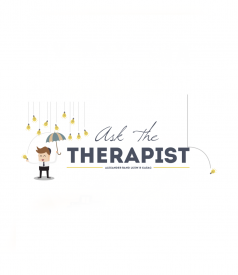Alexander Rand LCSW-R CASAC is a licensed clinical social worker and addictions therapist. He received his master’s degree from Fordham University. He has worked in both inpatient and outpatient facilities, at various Yeshiva high schools in Brooklyn, and as an administrative supervisor for JBFCS
He currently maintains a private practice in Brooklyn NY and serves as an adjunct professor at Brooklyn College and Touro College Graduate School of Social Work.
May 31, 2018
Other posts by:
Alexander Rand
Follow us

Q I am ashamed to ask this question, but I don’t know what to do anymore at this point. My husband comes home from shul every Shabbos afternoon either slightly or completely drunk. Sometimes we are able to have a seudah with the children, but other times he falls asleep either on the couch or at the table. Whenever I bring this up he tells me that all men drink, that I am trying to be controlling, and that I should leave him alone. Sometimes he apologizes later in the day, but it just keeps happening. I am scared that I will never have a normal Shabbos table. Is there anything I can do, or do I have to just accept this and let go of my expectations?
A Thank you for your bravery in asking this question. This is not an easy issue to tackle and it is clear that it’s causing a lot of pain in your life. The phenomenon of excessive drinking on Shabbos at kiddushim is one that has been around for some time despite efforts throughout the years by Rabbanim, therapists, and askanim to curb the issue. I have seen marriages fall apart as the result on this issue (although to be fair, there are typically other significant concerns as well)
There are instances in marriage where a spouse has to learn to accept behaviors of his or her partner in order to maintain peace, but I do not believe this is one of them. Not taking any action at this point will just reinforce the behavior, and the likelihood of it ever stopping is not very high. Initially, I would suggest setting up a time to talk with him about this (not on Shabbos) and to let him know how much this is hurting you and the marriage. You might want to ask him how would he react if some nights when he came home from work you were drunk and asleep and there was no dinner prepared. I am sure that wouldn’t work for any husband. Why should there a double standard? If despite your efforts to express how this is affecting you he continues to ignore your requests, there are a number of options you can pursue.
The first thing to realize is that in any relationship it’s a major red flag when one partner continues a behavior despite knowing how much it is negatively impacting the other. I am not sure if there are other instances in your marriage where this exists, but a relationship where one partner ignores the pain of the other is lacking in its foundation and will likely continue to erode over time. Some people might not like this approach, but if you trust the rabbi of the shul that he davens in (and it is someone that your husband respects) it might be worth reaching out to him and explaining what is happening. You can decide if you would tell your husband what you plan to do prior or first go to the Rav and then take it from there. If your husband still refuses to change, I would strongly suggest considering therapy for yourself to get the support you need as well as additional guidance in how to best address what is going on. There are free self-help groups called Al- Anon that offer support for friends or family members of people struggling with alcohol or drug use. A list of meetings can be found at http://www.nycalanon.org/meetings.html
There is a second point that needs to be addressed and that is the misconception that if someone only drinks on weekends it must mean they don’t have a problem with alcohol. While it might be true that according to some of the medical criteria they don’t suffer from classic alcoholism or addiction, any use that impairs one’s significant relationships is indicative of problematic use. Sometimes, even weekend use can indicate a need for treatment.
Our knee jerk reaction is often to want to ban something completely in our communities in reaction to problems it may be causing. While some might find that helpful, I don’t think the answer is to eliminate alcohol completely from our homes and shuls, but rather for people to learn to drink responsibly or to choose not to drink at all if they prove they cannot control the amount they drink once they start. Just like with internet use, it is typically not realistic to eliminate all internet use to avoid problematic use, rather we want to help people learn to use it responsibly.
There is an additional issue related to this that I would like to touch on. The issue is teens in shul exposed to adults drinking excessively. This is something that should not be ignored. Many teens will model their behavior after the adults in their lives or those around them. It is no longer uncommon to see teens getting drunk at kiddushim in many of our neighborhoods. Amudim, an organization geared to provide help and assistance in this area as well as others, has a poignant video on this topic entitled “The Kiddush Club” that can be viewed online.
Thank you again for your bravery in addressing this issue. I am sure there are others in similar situations that can relate to what you are going though and I hope this can provide some guidance and direction to those that need it.



